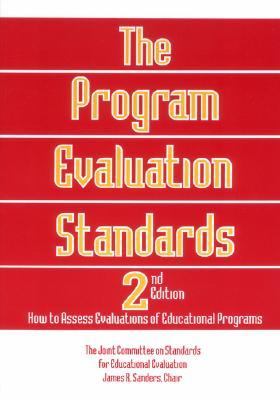204055
9780803957329
Program Evaluation Standards How to Assess Evaluations of Educational Programs
by Joint Committee on Standards for Educational Evaluation Staff, Sanders, James R.
Product details
- ISBN-13: 9780803957329
- ISBN: 0803957327
- Edition: 2
- Publication Date: 1994
- Publisher: SAGE Publications, Incorporated
AUTHOR
SUMMARY
"The Program Evaluation Standards is a 'must-have' book for anyone responsible for reviewing evaluation proposals, planning and conducting evaluations, managing evaluation projects, or judging the merit and worth of evaluations once completed. For experienced practitioners, it provides a set of values and principles by which to guide successful practice, that is, a set of criteria that determines whether educational evaluations are trustworthy and fair. The Standards sets expectations of the design and implementation of educational evaluation for all practitioners in all types of educational arenas, even those involved in social programming endeavors. For newcomers and those less experienced who may be responsible for commissioning and using evaluations, the Standards supplies a useful framework of generating a list of questions to raise about any evaluation plan or final report in an effort to assess its pros and cons. The book is an invaluable 'how-to' resource for graduate students venturing out into the field, and it instills a sense of what it means to be a responsible evaluator. For clients or consumers, the book offers advice on what they should expect of an evaluation. In my work setting, all new hires entering our evaluation unit are immediately given a copy of the book, a practice that I would recommend to any group that provides evaluation services. "Each standard is explained in just a few pages using a format that makes the book easy to read and navigate through. It is crisply written with user-friendly language. . . . The extra examples provide a greater range of applicability, thereby strengthening the book. . . . There are newly added navigational and cuing devices that improve the ability of the reader to scan and move through the book more effectively. . . . The Standards will continue to be an important sourcebook for scholars, practitioners, and administrators working in educational program evaluation. "The second edition provides evaluators and users of evaluation with practical guidelines for planning, implementing, and judging evaluations in educational and social programming. This new edition is further strengthened by more diverse illustrative cases, a supporting bibliography, and guidelines that reflect some of the changes that have occurred in evaluation over the past decade. Its wide appeal for seasoned practitioners, as well as for those less experienced, suggests that the second edition will continue to make a significant contribution to the preparation and practice of evaluators and administrators working in educational and social program evaluation." --Journal of Educational Measurement "Although they were developed primarily for the field of education, these standards can be applied to a broader range of evaluation settings. . . . The Program Evaluation Standards offer a pragmatic, 'how-to,' user-friendly guide to program evaluation. . . . We found that simply reading the standards for evaluation is an excellent training exercise for legislative program evaluators. Basing formal staff training on the evaluation standards may be more effective. Actual implementation of the standards in ongoing projects would constitute a sound basis for ensuring quality and uniformity of program evaluations. We strongly encourage you to at least explore these standards for use in your organization." --Linda Triplett and Kathleen Sullivan in NLPES News Aimed at providing a guide for evaluating educational and training programs, projects, and materials in a variety of settings, these 30 standards were compiled by the Joint Committee from knowledge gained from the professional literature as well as from years of experience by educators and evaluation specialists. The 30 standards are categorized into four groups corresponding to the four attributes of sound and fair program evaluation: utility, feasibility, propriety, and accuracy. Each standard isJoint Committee on Standards for Educational Evaluation Staff is the author of 'Program Evaluation Standards How to Assess Evaluations of Educational Programs', published 1994 under ISBN 9780803957329 and ISBN 0803957327.
[read more]



